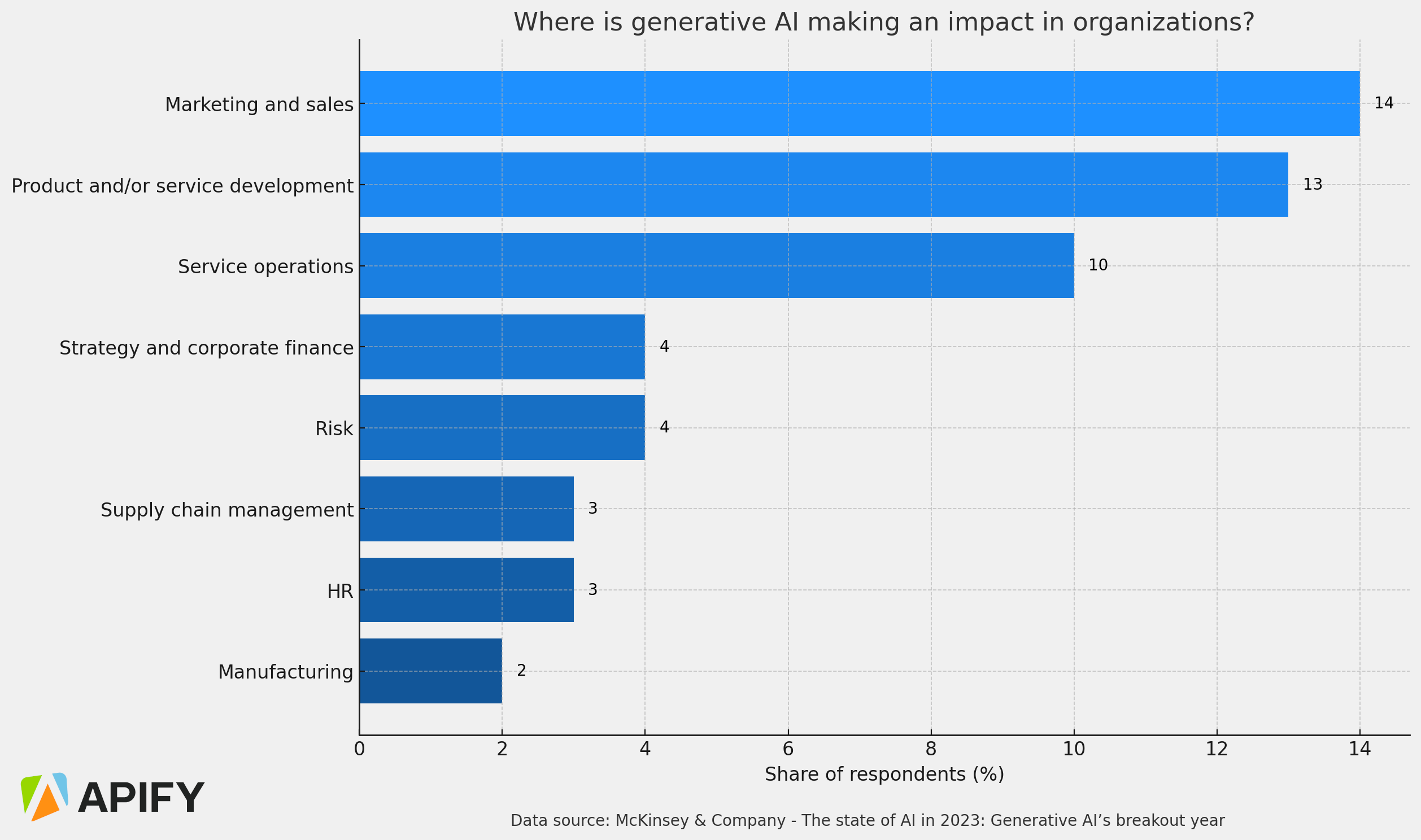AI in marketing: using the right tools to grow in 2023
Discover how AI is reshaping the future of marketing, with a projected value of $108B by 2028. Learn key tools, strategies, and real-world cases.
Hi, we're Apify. The Apify platform gives you access to 1,500+ tools to get data from popular websites, including Instagram, Facebook, and Reddit. Check us out.
Imagine a world where marketing campaigns are tailored to individual preferences, customer experiences are personalized, and businesses can predict market trends with pinpoint accuracy. Sounds like a dream, right? Well, we might nearly be there, thanks to the power of artificial intelligence (AI) in marketing.
AI marketing tools are rapidly transforming the marketing landscape, and businesses can not only engage customers in a more personalized manner but also drive growth like never before. It's the future of marketing, and if you aren't ready, you'll get left behind, so let's look at what 2023 and beyond have in store.
Key takeaways for marketers
AI marketing is revolutionizing the industry, with a current value of $27.4 billion and a projected value of $108 billion by 2028.
Businesses can maximize potential through data collection and integration into existing strategies, while addressing challenges such as privacy and expertise acquisition.
Real-world successes from Netflix, Spotify, and Amazon demonstrate AI’s ability to improve customer experiences and drive growth.
Rise of the machines: AI in marketing

Usage of AI in marketing is already ahead of other departments in 2023
The marketing industry is experiencing a paradigm shift as generative AI marketing tools continue to disrupt the way businesses approach customer engagement. This transformation is fueled by the increasing importance of customer and market data, which has become an intrinsic element of digital marketing campaigns. Marketing leaders are now leveraging machine learning programs to drive customer engagement by automating tasks that once required human intelligence, such as analyzing the customer journey and optimizing marketing campaigns.
As AI marketing adoption continues to grow, businesses are capitalizing on the potential of AI to deliver personalized content, analyze vast amounts of data, and make data-driven decisions. This has led to a surge in market growth and an increasing number of marketing teams incorporating AI into their strategies. The key drivers of this adoption include improved customer targeting, increased ROI, and the ability to analyze large amounts of data quickly.
Market growth and projections
The AI marketing industry is currently estimated to be worth $27.4 billion, with a significant portion of this growth attributed to the increasing importance of customer data in marketing strategies. AI is equipped with a range of sophisticated technologies, including:
Content creation
Task automation
Speech and image recognition
Natural language processing
Problem-solving
Coding ability
These technologies enable AI to learn, act, and perform with a level of intelligence similar to that of a human. It doesn't necessarily matter that LLMs aren't really AI, because they can simulate behavior that does the job.
It’s projected that by 2028, AI’s role in marketing will amass an impressive value of $108 billion, a result of the escalating reliance on customer and market data in forming marketing strategies. As AI continues to develop intelligent machines and devices with the capacity for cognitive processes similar to those of humans, its potential impact on various industries, including marketing, is truly remarkable. This technology has been referred to as the “next step” in the industrial revolution, enabling marketers to better understand and reach their target audience.
Drivers of AI marketing adoption
The ability to refine customer targeting is a compelling reason for the adoption of AI in marketing. Businesses can use artificial intelligence and machine learning to analyze customer data, predict behavior, and deliver highly personalized marketing messages. This, in turn, leads to greater customer satisfaction and engagement, ultimately driving higher ROI for marketing campaigns.
Programmatic advertising, which involves the automated buying and selling of online advertising, is the foremost application of AI technology in marketing. AI can drastically enhance marketing efficiency by automating tasks that previously required human intelligence and let companies concentrate on other components of digital marketing.
Essential AI marketing tools

In the dynamic world of marketing, businesses must use the right AI tools to maintain their competitive edge. Essential AI marketing tools such as content optimization and personalization tools, chatbots like Intercom's Fin, and social media management tools can help businesses succeed in content generation, social media management, and customer segmentation.
These AI-powered tools enable businesses to harness the power of artificial intelligence and machine learning to deliver personalized marketing campaigns, analyze customer data, and improve overall marketing efficiency. Keeping up to date on the latest AI advancements and trends allows businesses to remain competitive, adapt to the evolving marketing landscape, and boost customer engagement levels.
Content generation and optimization
AI tools are transforming the process of content creation and optimization. AI-powered tools can use customer preferences and behavior to generate content that suits the target audience, thereby enhancing engagement and conversion rates. Innovations like OpenAI's GPT and Jasper, an AI platform for generating high-quality ads, emails, landing pages, articles, and social media posts, are just a few examples of the power of AI in content generation.
While AI-generated content has the potential to save time and resources, it is essential to remember the importance of human supervision in ensuring accuracy, impartiality, and consistency with the brand’s tone. By combining the power of AI with human intelligence, marketers can create content that not only appeals to their target audience but also drives tangible results.
Social media management
AI-powered social media management tools are transforming the way businesses engage with their audiences on social media platforms. By streamlining the process of posting, targeting, and analyzing performance, these tools help businesses save time and resources while maximizing the impact of their social media campaigns.
Rapidely and FeedHive are just two examples of tools that are using AI to revolutionize social media content creation, and there are more popping up all the time. Other more generic generative AI-powered tools include ChatGPT, which is also highly capable of generating creative content, and Claude, known for its ability to automate and optimize social media advertising. Even Bard and Bing can happily generate content, given the right instructions.
As people start to insert these tools into their workflows (becoming centaurs or cyborgs, as a recent paper argued), AI marketing tools will transform what marketers are capable of, both in terms of efficiency and speed. These AI-powered social media management tools can help businesses outpace their competition and enhance customer engagement on multiple platforms.
Customer segmentation and personalization
Customer segmentation and personalization are critical components of any successful marketing strategy. By dividing customers into distinct groups based on their characteristics and providing tailored marketing messages to each group, businesses can ensure their marketing efforts resonate with their target audience.
AI has the potential to enable businesses to effectively segment their audience and deliver personalized marketing messages, thereby improving customer satisfaction and loyalty. Utilizing AI to deliver personalized content not only enhances the customer experience but also forms a strong connection with customers, fostering loyalty among users.
The continuous use of AI for customer segmentation and personalization can lead to considerable enhancements in marketing strategies and overall customer satisfaction for businesses.
Implementing AI marketing strategies

Implementing AI marketing strategies involves a multi-step process that includes gathering and examining data, incorporating AI with existing marketing initiatives, and gauging success. A significant amount of data is essential to educate the AI marketing tool on customer preferences, external trends, and other elements that will influence the success of AI-enabled marketing campaigns.
Organizations can leverage the following data sources for AI marketing:
Their own CRM
Previous marketing campaigns
Website data
Second and third-party data, such as location data, weather data, and other external factors that may influence a purchasing decision.
Collecting high-quality data for AI and integrating it into existing marketing strategies allows businesses to exploit the full potential of AI marketing to achieve measurable outcomes.
Data collection and analysis
Data collection and data analysis are essential for AI marketing tools to deliver precise insights and recommendations. High-quality data is indispensable for AI marketing to be effective, as it provides more accurate predictions and improved decision-making.
Businesses that leverage AI tools for data collection and analysis can benefit from valuable insights into customer preferences and behavior, enabling marketing teams to boost conversion rates and enhance the customer experience on their platform. By prioritizing data quality and ensuring responsible data usage, businesses can maximize the potential of AI marketing tools and drive tangible results.
Integrating AI with existing marketing efforts
Integrating AI with existing marketing efforts can optimize campaigns, improve targeting, and increase efficiency. AI can be utilized to optimize campaigns by leveraging data-driven insights to recognize trends and opportunities, and by automating processes to minimize manual labor.
Predictive analytics, a key component of AI marketing, enables the identification of customer segments and the personalization of content for each segment. This, in turn, leads to increased customer satisfaction and engagement, ultimately driving higher ROI for marketing campaigns. By seamlessly integrating AI with existing marketing efforts, businesses can unlock the full potential of AI marketing and drive real results.
Measuring success and ROI
Measuring the success and ROI of AI marketing efforts is essential for businesses to optimize their strategies and make informed decisions. Success for AI marketing can be measured through probabilistic metrics, rigorous validation, user-centric evaluations, and AI-related KPIs that demonstrate a tangible return on investment (ROI). Additionally, conversion rate optimization, net promoter score, customer lifetime value (CLV), customer churn rate, and sentiment analysis can be employed to assess success.
Clear objectives and KPIs enable businesses to assess the effectiveness of their AI-enhanced marketing initiatives and make informed decisions to fine-tune their strategies. This, in turn, leads to improved customer experiences, increased revenue, and overall business growth.
Overcoming challenges in AI marketing adoption[
](blog.apify.com/content/images/2023/09/ai-ma..)

While AI marketing offers plenty of benefits and opportunities for businesses, there are also challenges that need to be addressed. These challenges include privacy, AI copyright, and ethical concerns, acquiring AI expertise, and adapting to the changing marketing landscape. By recognizing and addressing these challenges, businesses can successfully adopt AI marketing tools and strategies, ensuring continued success in the ever-evolving world of marketing.
With the growing adoption of AI marketing, it’s essential for businesses to keep up with the latest AI advancements and trends. This not only bolsters their competitive edge in the dynamic marketing landscape but also significantly boosts customer engagement. By overcoming these challenges and leveraging the power of AI, businesses can unlock the full potential of AI marketing and drive tangible results.
Privacy and ethical concerns
Privacy and ethical concerns are paramount when implementing AI marketing tools. Businesses need to ensure responsible data collection and usage while adhering to applicable regulations such as the General Data Protection Regulation (GDPR). Failing to address privacy considerations can lead to severe penalties and reputational harm for businesses.
Businesses can foster customer trust and ensure compliance with pertinent laws and regulations in their AI marketing endeavors by giving due importance to data privacy and ethical considerations. This, in turn, helps to foster customer loyalty and drive long-term success for businesses.
Acquiring AI expertise
Acquiring AI expertise is essential for businesses to effectively implement and manage AI marketing tools and strategies. This includes investing in training and recruiting AI experts, as well as constructing the requisite infrastructure.
One of the challenges businesses encounter when introducing AI marketing tools is the lack of employees possessing the required data science and AI skills. Businesses can ensure a successful adoption of AI marketing tools and strategies, and sustain success in the fast-paced world of marketing by enhancing AI proficiency and investing in requisite talent and infrastructure.
Adapting to the changing marketing landscape
The marketing landscape is constantly changing, and businesses need to stay updated on AI advancements and trends to remain competitive. This involves recognizing customer requirements, utilizing data-based intelligence, and capitalizing on AI-enabled automation.
Keeping up with the latest AI advancements and trends helps businesses maintain their success and escalate customer engagement.
Adapting to the changing marketing landscape also requires businesses to:
Invest in their marketing teams, providing them with the necessary skills and resources to effectively leverage AI marketing tools and strategies
Foster a culture of continuous learning and innovation
Stay ahead of the curve and drive long-term success in the ever-evolving world of marketing
Real-world AI marketing success stories

Real-world AI marketing success stories showcase the immense potential of AI in improving customer experiences and driving business growth. Companies like Netflix, Spotify, and Amazon were all early adopters of the power of AI to transform their marketing efforts and deliver personalized experiences to their customers. By studying these success stories, businesses can gain valuable insights into the power of AI marketing and how it can revolutionize their own marketing efforts.
With an increasing number of businesses recognizing the potential of AI marketing, the future of the industry appears promising. With AI-powered tools and strategies at their disposal, businesses can not only engage customers like never before but also drive growth and success in ways previously unimaginable.
Netflix
Netflix, the popular streaming platform, uses AI to personalize content recommendations and artwork for its users. By employing machine learning to comprehend the genres a particular user is interested in, Netflix customizes the artwork that the user observes to align with these preferences. This AI-driven personalization enhances conversion rates and optimizes the customer experience on their platform.
The success of Netflix’s AI marketing strategy demonstrates the power of AI in delivering personalized content that resonates with users, ultimately increasing viewer engagement and satisfaction. Netflix’s use of AI to optimize content recommendations has transformed the user experience in discovering and consuming content on their platform.
Spotify
Spotify, the music streaming giant, leverages AI to create customized playlists and recommendations for its users based on their:
music preferences
podcast preferences
purchase history
location
brand interactions
This personalized approach to content recommendations not only enhances user experiences but also drives customer loyalty, as users perceive the platform to be customized to their individual needs.
Spotify’s use of AI has reshaped how users discover and enjoy music, thereby strengthening its bond with users and fostering their loyalty. This success story highlights the potential of AI marketing in delivering personalized experiences that resonate with customers and drive long-term success.
Amazon
Amazon, the e-commerce giant, utilizes AI for sales forecasting, product recommendations, and campaign analysis. By leveraging AI, Amazon is able to gain a better understanding of customer needs and preferences and offer more customized product recommendations. AI-driven marketing strategies have enabled Amazon to analyze data more efficiently and optimize campaigns for maximum efficacy, leading to improved customer experiences and increased revenue.
Amazon’s success in utilizing AI marketing demonstrates the power of this technology in enhancing customer satisfaction and driving business growth. The use of AI marketing tools and strategies allows businesses to tap into the full potential of AI and achieve tangible outcomes in their marketing initiatives.
...and one AI marketing fail
Coca-Cola, the oldest giant in this list, took a futuristic leap in September 2023 with its Y3000 flavor, crafted with AI's help. The drink got people talking, but its gimmicky new flavor has been described as bland and just "buzzwords, not buzzworthy", showing that AI's creativity has its charms, but hitting the right note with human taste is still a tricky game that can backfire spectacularly.
The future of marketing and AI
The transformative power of AI marketing is undeniable. From personalizing content recommendations to optimizing campaigns and analyzing vast amounts of data, AI marketing tools have the potential to revolutionize the way businesses engage with customers and drive growth. By acquiring AI expertise, addressing privacy and ethical concerns, and adapting to the changing marketing landscape, businesses can harness the full potential of AI marketing and stay ahead of the competition.
As real-world success stories like Netflix, Spotify, and Amazon show, AI marketing is not just a futuristic concept but a reality that is already driving tangible results for businesses across various industries. Are you ready to embrace the future of marketing and unlock the unlimited potential of AI?
Frequently asked questions
What is AI marketing?
AI marketing uses artificial intelligence technologies and data analysis to identify potential customers and provide highly precise insights into customer journeys, market trends, and content optimization. Automated decisions can be made based on audience or economic trends that may impact marketing efforts, leading to more personalized and targeted assets.
Is AI marketing working?
AI marketing is proving to be an essential tool for companies, allowing them to handle customer support inquiries, create personalized offers, and analyze data. It is transforming the way we work and continues to shape the future of marketing.
What's one AI marketing tip for small businesses?
Small businesses should leverage AI-powered chatbots like Intercom's Fin to provide customers with personalized recommendations and support, helping to build a more engaged customer base.
How to make money with AI marketing?
Make money with AI marketing by generating content, using it for web design, creating and selling products, providing integration services, offering consulting services, investing in AI startups, writing blogs or copywriting with AI writers, creating and selling AI-generated artwork, doing freelance digital marketing, optimizing sales operations, and editing photos.
What are some key advantages of AI marketing?
AI marketing offers key advantages to digital marketing campaigns, such as enhanced customer targeting, amplified ROI, and the capacity to quickly analyze large amounts of data.

